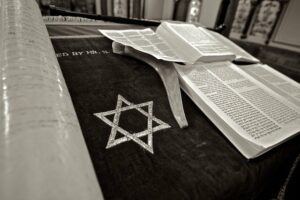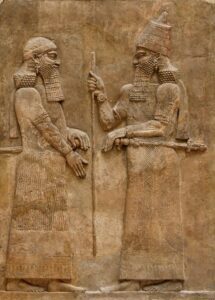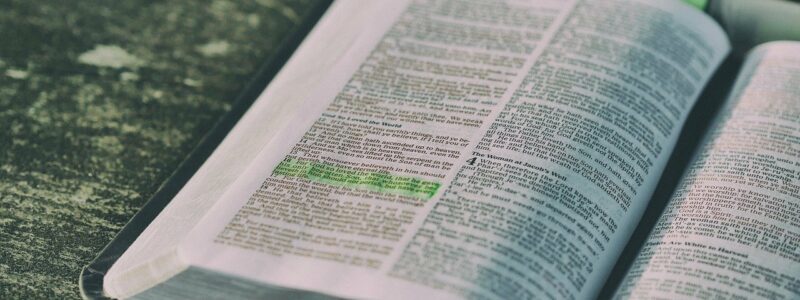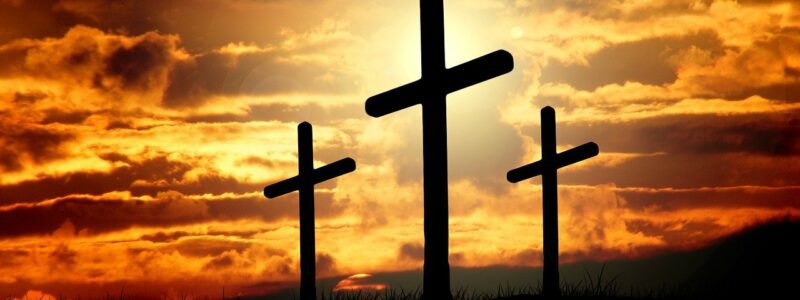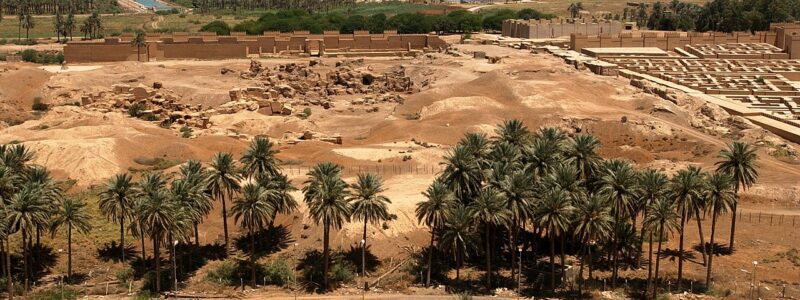Ruth
Ruth is a small book buried in the Old Testament. It consists of only about 2500 words but it conveys a great picture of a redeemer. As part of the redeemer image, Ruth was adopted into the lineage of the great redeemer, Christ.
This book is particularly useful for those without a Jewish understanding of the Torah. While Christians understand the notion of a redeemer in the context of Christ’s sacrifice for us, they only have a vague understanding of what it meant to be a “redeemer” in ancient Jewish law.
The story uses these Jewish principles with Boaz accepting the role of Redeemer, and in that capacity is a foreshadowing of Christ. Boaz is the great-grandfather of King David and is in the direct lineage of Christ.
It is also a touching tale of Ruth and Naomi and the fidelity between two relatives. Finally, it also teaches a story of forgiveness.
Moab was a country that obstructed the Jewish occupation of the Promised Land. Because of this, they were cursed and would not be able to interact with Israel for at least ten generations.
Moab was a land of gods that were foreign to Israel resulting in idol worship and child sacrifice.
Introduction to Ruth
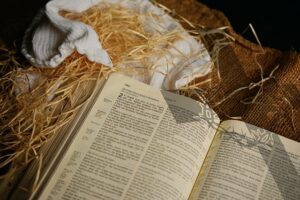
Bethlehem mentioned many places in Old Testament including the story of Ruth. Image by congerdesign from Pixabay
Naomi and her husband were living in Bethlehem – certainly, a connection to Christ begins in the first few verses.
There was a “famine in the land” and many Jews were leaving their homes to go elsewhere in search of food and water.
Naomi was no exception. The family was a righteous one, and no doubt a difficult decision for her to leave everything she knew and go to a foreign land with a foreign language and certainly a foreign civilization.
Scripture gives no indication that the family was “called” out of Israel as with Jacob and his family. It is unclear whether the decision to leave Bethlehem was the result of prayer or of desperation.
Naomi, her husband Elimelech, and her two sons left the Promised Land for Moab.
The Land of Moab
The country of Moab is an important part of the Book of Ruth in the Bible. Most people know little about the Moab because it is no longer in existence today – we will get to the reason they have disappeared from the Earth shortly.
Moab was formed back in the time of Abraham hundreds of years before the Ruth story. The cities of Sodom and Gomorrha were destroyed for their sinful behavior after Abraham was able to rescue his son Lot from the city. Lot had two daughters who probably lost their husbands in the conflagration associated with the destruction of these cities. They apparently were anxious to have children and decided on getting their father inebriated and having children through him.
The child produced from the incestuous relationship between Lot and his oldest daughter was named Moab, and he became the father of this nation. Incestuous relationships ae condemned in Scripture and so in a sense the Moab nation was condemned form the beginning.
God’s Curse on Moab
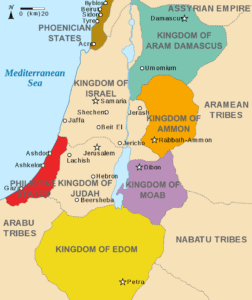
Ancient Kingdoms surrounding Israel – By Kingdoms_of_Israel_and_Judah_map_830.svg: *Oldtidens_Israel_&_Judea.svg: FinnWikiNoderivative work: Richardprins (talk)derivative work: Richardprins (talk) – Kingdoms_of_Israel_and_Judah_map_830.svg, CC BY-SA 3.0, Link
Early in Scripture, it becomes clear that Israel is God’s chosen people. They are not chosen because of their faith, ancestry, or any aspect of their own doing. Rather, they were chosen by God due to his own reasons which we do not understand.
There are two different reasons for the curse on Moab.
The Old Testament book of Numbers provides one explanation. Balaam produced a messianic prophecy of his own noting,
I shall see him, but not now: I shall behold him, but not nigh: there shall come a Star out of Jacob, and a Scepter shall rise out of Israel, and shall smite the corners of Moab, and destroy all the children of Sheth”
This is yet to be fulfilled prophesy extending into the future. The land of Moab was cursed and even now is a desert teeming with refugees as modern-day Jordan.
Another curse is to be found in Deuteronomy 23: 3-4,
shall not enter into the congregations of the Lord, even to their tenth generation shall they not enter into the congregation of the Lord forever. Because they met you [Israel] not with bread and with water in the way, when ye came forth out of Egypt; and because they hired against thee Balaam the son of Beor of Pethor of Mesopotamia, to curse thee.
The entire population of this region was affected their obstruction to Israel. By the time of Ruth and Naomi – much past the ten generational curse – they would be allowed into the congregation of Israel if they would assume Jewish customs.
The Relationship between Moab and Israel
Moab and Israel had a difficult relationship with each other. Moab ruled over Israel for much of the time during the time of the Judges before Saul and David. One of Saul’s first duties as a newly minted kind was to defeat Moab and achieve independence from the bondage to that country. David enjoyed a degree of peace in the land of Israel from Moab due to the success of Saul’s military campaigns against that country.
Moab also was an idolatrous country and rejected the God of Israel even though they were an offshoot from that country. Instead, they worshiped a god named Chemosh which included child sacrifice. All throughout the Old Testament, Israel struggles with child sacrifice within her own borders due to adopting the culture of surrounding countries.
It was customary for those who worshiped Chemosh to offer their infant children on an altar as a burnt sacrifice. Interestingly, this was a practice Jezebel would bring into Israel much later in their history when she imported Baal worship from the Phoenicians.
Elimelech and Naomi – a Famine in the Land
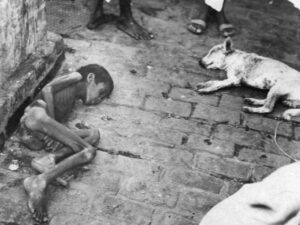
By Unknown – http://histclo.com/essay/war/ww2/cou/india/w2i-fam.html, Public Domain, Link
There is a famine in Israel making it difficult for most people to find enough to sustain themselves. Ruth and her husband leave Bethlehem and travel to Moab to live hoping for a better life in a foreign land.
While in Moab, tragedy strikes. Elimelech died leaving her to her two sons, Mahlon and Chilion. The two sons married women from Moab, Ruth, and Orpah. The extended family lived together in Moab for years waiting out the famine.
Then more tragedy; Ruth’s two sons die leaving her a widow and without sons to help take care of her. She is now desperate, literally fearing for her life. Women in ancient civilizations relied upon their husbands and children to take care of them. Without them, a widow had no income, especially in a foreign land.
Life in the Middle East now and at that time was very hard for women alone.
Naomi told Ruth and Orpah she would leave Moab and return to Bethlehem – at least she might be miserable with her own people. She would likely have greater sympathy in Israel where ancient Jews were admonished to take care of widows.
Naomi apparently had second thoughts about bringing her Moabite daughters-in-law back to Israel. Perhaps she knew they might not be welcomed there as they were not Jewish.
Go, return each to her mother’s house: the Lord deal kindly with you, as ye had dealt with the dead, and with me. The Lord grant you that ye may find rest, each of you in the house of her husband. Then she kissed them; and they lifted up their voice, and wept.
Orpah took up Naomi’s gift and she left the family to go back to Moab and her own people. She is never heard from again in Scripture as she returns to Moabite customs.
Ruth, on the other hand, decides to go back to Israel with Naomi. In one of the best-remembered verse of the Bible, she states,
Entreat me not to leave thee, or to return from following after thee: for whither thou goest, I will go; and where thou lodgest, I will lodge: they people shall be my people, and thy god my God: There thou diest, will I die, and there will I be buried: the Lord do so to me, and more also if ought but death part thee and me.
Meet Boaz (who will marry Ruth)
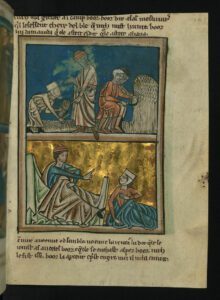
By William de Brailes – Walters Art Museum: Home page Info about artwork, Public Domain, Link
We then meet one of the central characters in this drama. Naomi returns to her hometown of Bethlehem worse off than when she left. She has no wealth, no husband, and no sons – she is alone. In her depression, she renames herself “Mara” meaning “Sad.” She has lost everything.
But she does remember a relative named Boaz. Boaz is related to her through her deceased husband and is apparently very rich. He is a landowner and raises barley which is coming into season. Boaz also appears to be a righteous man very familiar with Jewish customs regarding helping the poor.
Ruth suggests,
now go to the field, and glean ears of corn after him in whose sight I shall find grace. And [Naomi] said to her, Go, my daughter.
Gleaning is a provision for the poor from the time of Moses. In this provision, the corners of a crop are not harvested but are left for the poor.
The story notes Boaz took special notice of Ruth because she was the daughter-in-law of his relative, Naomi. He provided for her and had extra barley placed out in the field for her to take. Boaz has decided to take interest in Ruth.
Ruth then met Boaz
Then she fell on her face, and bowed herself to the ground, and said unto him, Why had I found grace in thine eyes, that thou should take knowledge of me, seeing I am a stranger? And Boaz answered and said to her, It has fully been shown me all that you have done unto your mother-in-law since the death of your husband: and how you have left your father and your mother and the land of your nativity, and have come unto a people that you knew not before. The Lord recompense your work, and a full reward be given you of the Lord God of Israel, under whose wings you have come to trust.
Then she said, Let me find favor in your sight, my lord; for that you have comforted me, and for that you have spoken friendly unto your handmaid, though I be not like one of your handmaidens. And Boaz said to her, At mealtime, come here and eat of the bread, and dip your morsel in the vinegar. And she sat beside the reapers: and he reached her parched corn, and she did eat, and was sufficed and left. And when she was risen up to glean, Boaz commanded his young men saying, Let her glean even among the sheaves and do not stop her. And let fall also some of the handfuls of purpose for her, and leave them, that she might glean them, and do not stop her. So she gleaned in the field until the evening, and beat out that she had gleaned: and it was about an ephah of barley. And she took it up, and went into the city: and her mother-in-law saw what she had gleaned: and she brought forth, and gave to her that she had reserved after she was sufficed.
Ruth’s Motives
What happens next can be confusing for many contemporary Christians because we do not understand the Torah.
Christians in our modern contemporary world have lost knowledge of ancient Jewish law and customs. It is because of this loss that many Christians do not understand what happens next in this narrative.
Naomi (a Jew) explains to Ruth (a Moabite) how Boaz had accepted Ruth as a kindred. This means a lot in the ancient world because Boaz was taking responsibility for Ruth’s well-being. Ruth was a relative of Boaz through Naomi’s husband.
Boaz was apparently a very wealthy landowner who was familiar with the law of Moses.
Kindred Redemption
The next passage of the Torah will help explain what then happens. It concerns the possibility that the husband of a wife dies before she has children.
Being a widow was very difficult in ancient societies as women had little legal standing. Work was hard to find, and they had no one to take care of them, raise crops, do the hard work around the house.
So if the deceased husband had a brother, that brother was responsible for taking the widow as his wife and bear children through her.
If brethren dwell together, and one of them die, and have no child, the wife ot he dead shall not marry without unto a stranger: her husband’s brother shall go in unto her, and take her to him to wife, and to perform the duty of a husband’s brother unto her. And it shall be, that the firstborn which she beareth shall succeed in the name of his brother which is dead, that his name be not put out of Israel.
A Relative Refuses to be a Kinsman-Redeemer of Ruth
This was an extremely important duty in ancient Israel. If a brother refused to take this responsibility then he would be publicly humiliated,
And if the man like not to take the brother’s wife, then let his brother’s wife go up to the gate unto the elders, and say, My husband’s brother refuseth to raise up until his brother’s name in Israel, he will not perform the duty of my husband’s brother. Then the elders of his city shall call him, and speak unto him, and if he stand to it, and say, I will not to take her: Then shall his brother’s wife come unto him in the presence of the elders, and loose his shoe from off his foot, and spit in his face, and shall answer and say, So shall it be done, unto the man that will not build up his brother’s house. And his name shall be called in Israel, The house of him that hath his shoe loosed.
What an unusual custom – to have your shoe loosed and be spit at in front of the respected elders of your town. Talk about humiliation!
So what happened next?
Boaz accepted Ruth’s request to be her husband and kinsman-redeemer. Unfortunately, there was one kinsman who was a closer relative than he was; he must be first offered the opportunity to be Ruth’s redeemer.
Boaz finds this unnamed redeemer person and offers him the chance to purchase the property of Naomi and Ruth – to be their redeemer. This other relative decided against the offer and removed his shoe!
Boaz Redeemer Speech
Boaz then goes to the village elders and says,
Ye are witness this day, that I have bought all that was Elimelech’s, and all that was Chilion’s and Mahlon’s, of the hand of Naomi. Moreover, Ruth the Moabitess, the wife of Mahlon, have I purchased to be my wife, to raise up the name of the dead upon his inheritance, that the name of the dead be not off from among his brethren, and form the gate of his place; ye are witnesses this day. And all the people that were in the gate, and the elders, said, We are witnesses. The Lord make the woman that is come into thing house like Rachel and like Leah, which two did build the house of Israel: and do thou worthily in Ephratah, and be famous in Bethlehem: And let thy house be like the house of Pharez, whom Tamar bare unto Judah, of the seed which the Lord shall give thee of this young woman. (Ruth 4: 9-12).
Women of Bethlehem rejoiced for Ruth and Naomi. Ruth subsequently had a son named Obed. Obed became the father of Jesse, and Jesse became the father of David – who would be King in Israel.
David’s line leads directly though multiple generations to Christ – the Redeemer of Israel.
The Kinsman Redeemer
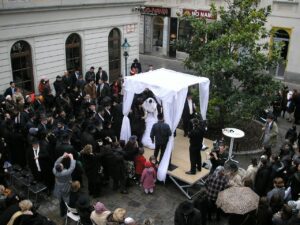
By Gryffindor – Own work, CC BY 2.5, Link
The role of kinsman-redeemer is found in Leviticus 25 in the case of an Israelite man’s death and fails to leave behind a son, the brother of the deceased man is commanded to take his widow as his wife. In this capacity, he will both redeem the land as well as provide a son to carry out the deceased man’s name.
The concept of redeeming the land is foreign to us today. Today, we buy and sell land with ownership of the land going to the new owners.
In ancient Israel, this was not the case. Each tribe of Israel had their own land, and each clan and family got a portion of that land. A man’s sons would inherit land from the father which would then pass down to their children.
The problem would be when a man did not have any sons who would have possessed the land when they died. In this case, it became the responsibility of any brothers of the man to have sons through the wife who would then inherit the land. This was referred to as “redeeming the land.”
Boaz performs this function by producing a son through Ruth named Obed, who would carry on Elimelek’s family line. Elimilek’s son did not have any children with Ruth before his death and Boaz performs the role of kinsman-redeemer.
In this situation, Boaz foreshadows Christ who is the ultimate kinsman-redeemer, who will redeem for himself a bride – the Church. Through Obed, the won of Boaz and Ruth, Christ would come to redeem all the people of God.
The Destruction of Moab
Moab was ripe for judgment from God for their idolatrous behavior, fighting against Israel, and child sacrifice. The final curse on Moab was pronounced by Isaiah. In Isaiah 14, God says,
Within three years, as a hired man would count them, the glory of Moab will be degraded along with all its great population, and his remnant will be very small and impotent. … God is going to give you three more years, and that’s the end.
Three more years from the pronouncement of Isaiah would conclude in the year 715 B.C. or about 300 years after David. An Assyrian king named Sargon came into Moab and utterly destroyed the nation. The population largely was killed leaving only a small remnant behind.
The nation was utterly destroyed and would never be heard from again.
During the same military campaign, Sargon II also destroyed the Northern Ten Tribes of Israel leaving only two tribes behind – Judah and Benjamin. Bethlehem was in the country of Benjamin and would be the birthplace of the Messiah seven centuries later.
Summary
Boaz is a type or a shadow of Christ. He is a redeemer of the faithful Naomi and Ruth. He is their kinsman-redeemer who buys their property and Ruth agrees to become his wife.
Because of Boaz’s faithfulness, Ruth is able to have children, and they will lead directly to Christ.
It is a clear picture of a Christ-like figure in the Old Testament.
Current-day Christians have a hard time understanding ancient Jewish rituals such as the kinsman-redeemer. It was put in place so that a widow might not have to face the rest of her life without having children or protection from her husband.

